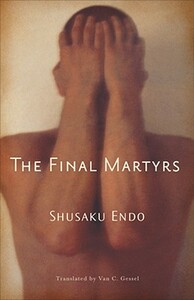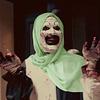Take a photo of a barcode or cover
challenging
dark
hopeful
reflective
medium-paced
Plot or Character Driven:
Character
Strong character development:
Yes
Loveable characters:
Complicated
Diverse cast of characters:
No
Flaws of characters a main focus:
Yes
Follow me on Instagram: www.instagram.com/thisotherbookaccount
The thing about your favourite author being dead is that you have to ration his books. I limit myself to one Endō book a year, and I’m happy to report that The Final Martyrs, his only short story collection, is among his best.
Written and published between 1959 and 1985, the 11 short stories here chart the entirety of Endō’s career. Fans of his works will recognise many familiar themes, from Catholicism and mortality to sexuality, regrets and redemption, as if these were test runs for his longer novels.
The titular story, The Final Martyrs, treads similar grounds as those in Silence, with a small but persistent group of Christians trying to live out their lives under persecution. The Last Supper, too, has echoes of The Sea and Poison, both dealing with war and guilt.
There are several stories that, according to Endō himself, are semi-autographical in nature, though you never quite know where the facts end and the fiction begins. Life, for example, is told from the perspective of a young Japanese boy not unlike Endō, who also grew up in Japanese-occupied Manchuria. It’s a moving story about an occupation told from a child’s POV, and the secrets we keep that eventually festers and turns into guilt. The Sixty-Year-Old Man, too, sees a fictionalised version Endō as he struggles with his age, a desire for young girls, and how it somehow parallels the persecution of Christ. I know, I know, it sounds like a stretch, but Endō makes it work.
My favourite is Heading Home, which explores the meaning of ‘home’ and ‘mortality’ in three drastically different ways. There are passages about family and loss that truly worked on a deep-seated level for me, and the story ends on a quiet but haunting note that will ring long after the book is done.
I wasn’t expecting much from this collection, but I’m proud to have read it. I also want to give a shout out to Gessel, who is one of my favourite translators of Japanese fiction.
The thing about your favourite author being dead is that you have to ration his books. I limit myself to one Endō book a year, and I’m happy to report that The Final Martyrs, his only short story collection, is among his best.
Written and published between 1959 and 1985, the 11 short stories here chart the entirety of Endō’s career. Fans of his works will recognise many familiar themes, from Catholicism and mortality to sexuality, regrets and redemption, as if these were test runs for his longer novels.
The titular story, The Final Martyrs, treads similar grounds as those in Silence, with a small but persistent group of Christians trying to live out their lives under persecution. The Last Supper, too, has echoes of The Sea and Poison, both dealing with war and guilt.
There are several stories that, according to Endō himself, are semi-autographical in nature, though you never quite know where the facts end and the fiction begins. Life, for example, is told from the perspective of a young Japanese boy not unlike Endō, who also grew up in Japanese-occupied Manchuria. It’s a moving story about an occupation told from a child’s POV, and the secrets we keep that eventually festers and turns into guilt. The Sixty-Year-Old Man, too, sees a fictionalised version Endō as he struggles with his age, a desire for young girls, and how it somehow parallels the persecution of Christ. I know, I know, it sounds like a stretch, but Endō makes it work.
My favourite is Heading Home, which explores the meaning of ‘home’ and ‘mortality’ in three drastically different ways. There are passages about family and loss that truly worked on a deep-seated level for me, and the story ends on a quiet but haunting note that will ring long after the book is done.
I wasn’t expecting much from this collection, but I’m proud to have read it. I also want to give a shout out to Gessel, who is one of my favourite translators of Japanese fiction.
The Final Martyrs is a collection of eleven short stories that serve a variety of purposes. Some are semi autobiographical, some serve to help develop early proto-characters that will be fleshed out in his later novels, and some are merely stories that deliver Endo’s common themes, but in bite size format.
I would not recommend this as an introduction to Endo’s writing. As much as I appreciated these stories, my enjoyment was deepened by having spent time in his later novels and seeing the culmination of his years of labor in wrestling with these stories, characters, and themes.
Endo has a spectacular way of weaving the core of his faith into almost every work. This core is reflected in the fallibility of Christians contrasted against the quiet sufficiency and kindness of God. These failures are reflected in the historical fiction of “The Final Martyrs”, the semi autobiographical story of his youth in “Shadows”, and most painfully in the introspective “The Sixty Year Old Man”. Other themes include the depravity of humanity, hopelessness and empathy in old age, the inevitability of death, and more.
Reading Endo’s work is always a heavy practice for me. In doing so, I’m often faced with my own fallibility and mortality. His words weigh me down and they bring me face to face with an oft neglected reality of this life: grief. But, in reading his works, I’m invited to observe this grief with a guide who carefully and artistically navigates these somber realities for my good and growth. This is complex nature and gifting of Shusaku Endo.
I would not recommend this as an introduction to Endo’s writing. As much as I appreciated these stories, my enjoyment was deepened by having spent time in his later novels and seeing the culmination of his years of labor in wrestling with these stories, characters, and themes.
Endo has a spectacular way of weaving the core of his faith into almost every work. This core is reflected in the fallibility of Christians contrasted against the quiet sufficiency and kindness of God. These failures are reflected in the historical fiction of “The Final Martyrs”, the semi autobiographical story of his youth in “Shadows”, and most painfully in the introspective “The Sixty Year Old Man”. Other themes include the depravity of humanity, hopelessness and empathy in old age, the inevitability of death, and more.
Reading Endo’s work is always a heavy practice for me. In doing so, I’m often faced with my own fallibility and mortality. His words weigh me down and they bring me face to face with an oft neglected reality of this life: grief. But, in reading his works, I’m invited to observe this grief with a guide who carefully and artistically navigates these somber realities for my good and growth. This is complex nature and gifting of Shusaku Endo.
emotional
hopeful
reflective
sad
medium-paced
Plot or Character Driven:
Character




